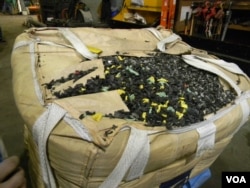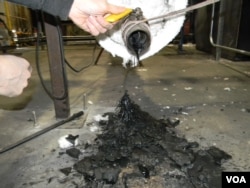BUFFALO, NEW YORK —
The next big thing in fuel could come from repurposed plastic. However, only seven percent of plastic waste in the United States is recycled each year, according to the Environmental Protection Agency.
A company in Niagara Falls, New York, is working to increase that percentage, with an eye toward reducing America’s dependence on foreign oil.
Plastic-eating monster
It's a machine known as the “plastic-eating monster.”
Every hour, thousands of kilograms of shredded milk jugs, water bottles, and grocery bags tumble into its large combustion chamber. The waste plastic comes from landfills and dumps across the United States.
John Bordyniuk, who runs his namesake company, JBI, Inc., invented the new process for converting plastic into a range of fuels.
First, many different kinds of unwashed plastics are melted together.
“The viscosity looks like milk," Bordyniuk says. "Almost like when you’re heating milk on the stove. Looks exactly like that, except it’s black.”
Bordyniuk uses a patented catalyst to vaporize the inky fluid and reduce the plastic to its most basic elements.
“Plastics are just long hydrocarbon chains," he says. "What we’re doing is re-forming them into links and chains that we want so they have a high fuel value.”
The system powers itself, with eight percent of the plastic waste running the process. Bordyniuk hired outside testers who concluded that nearly 86 percent of what goes in comes out as fuel.
Several grades of fuel
At the other end of the plastic eating machine, JBI executive Bob Molodynia looks on while a stream of thin brown liquid pours into an oil barrel.
“You could tap this right now and it’s ready to go," Molodynia says. "That’s a number six fuel, that’s what a lot of what US Steel uses, a lot of major companies, that’s what they pay the big bucks for, right there.”
JBI creates several grades of fuel for a variety of industries and sells them for up to $100 a barrel through national distributors. Each barrel costs about $10 to produce and JBI produces several thousand liters of oil a day.
The company has signed deals to set up operations next to large plastic waste dumps.
Bordyniuk believes plastics will become a significant source of domestic fuel that reduces the country’s dependence on foreign oil, while at the same time reducing the amount of plastic waste sitting in the country’s landfills.
Green process?
But just how “green” is this process when it produces fuels that pollute just like any other?
“Maybe the sequestration of carbon into a plastic bottle dumped in a landfill is better than converting it to liquid fuels and releasing, mobilizing a whole lot of carbon,” says Allen Hershkowitz, senior scientist with the Natural Resources Defense Council.
He says plastic-to-oil technology is still new and evolving, and there’s not enough data to determine whether or not the process is friendly to the environment.
And the jury’s still out on whether converting plastic to oil can even be considered “recycling.” So says Carson Maxted with Resource Recycling, the plastic recycling industry’s trade journal.
A handful of plastic-to-oil companies have cropped up in the past decade, each with its own method. Maxted says JBI is among the budding industry’s top tier partly because the company does something few other firms have been able, or willing, to do: utilize virtually all types of plastics
"They’re getting value from something that would otherwise go to the landfill, the plastics that are not easily recycled, they’re of low quality or of mixed plastic types, or that they’re dirty," Maxted says. "Things that wouldn’t be accepted into a recycler.”
And since there’s no lack of plastic waste or demand for oil, Maxted says JBI’s recycling technology has the potential to transform both industries.
A company in Niagara Falls, New York, is working to increase that percentage, with an eye toward reducing America’s dependence on foreign oil.
Plastic-eating monster
It's a machine known as the “plastic-eating monster.”
Every hour, thousands of kilograms of shredded milk jugs, water bottles, and grocery bags tumble into its large combustion chamber. The waste plastic comes from landfills and dumps across the United States.
John Bordyniuk, who runs his namesake company, JBI, Inc., invented the new process for converting plastic into a range of fuels.
First, many different kinds of unwashed plastics are melted together.
“The viscosity looks like milk," Bordyniuk says. "Almost like when you’re heating milk on the stove. Looks exactly like that, except it’s black.”
Bordyniuk uses a patented catalyst to vaporize the inky fluid and reduce the plastic to its most basic elements.
“Plastics are just long hydrocarbon chains," he says. "What we’re doing is re-forming them into links and chains that we want so they have a high fuel value.”
The system powers itself, with eight percent of the plastic waste running the process. Bordyniuk hired outside testers who concluded that nearly 86 percent of what goes in comes out as fuel.
Several grades of fuel
At the other end of the plastic eating machine, JBI executive Bob Molodynia looks on while a stream of thin brown liquid pours into an oil barrel.
“You could tap this right now and it’s ready to go," Molodynia says. "That’s a number six fuel, that’s what a lot of what US Steel uses, a lot of major companies, that’s what they pay the big bucks for, right there.”
JBI creates several grades of fuel for a variety of industries and sells them for up to $100 a barrel through national distributors. Each barrel costs about $10 to produce and JBI produces several thousand liters of oil a day.
The company has signed deals to set up operations next to large plastic waste dumps.
Bordyniuk believes plastics will become a significant source of domestic fuel that reduces the country’s dependence on foreign oil, while at the same time reducing the amount of plastic waste sitting in the country’s landfills.
Green process?
But just how “green” is this process when it produces fuels that pollute just like any other?
“Maybe the sequestration of carbon into a plastic bottle dumped in a landfill is better than converting it to liquid fuels and releasing, mobilizing a whole lot of carbon,” says Allen Hershkowitz, senior scientist with the Natural Resources Defense Council.
He says plastic-to-oil technology is still new and evolving, and there’s not enough data to determine whether or not the process is friendly to the environment.
And the jury’s still out on whether converting plastic to oil can even be considered “recycling.” So says Carson Maxted with Resource Recycling, the plastic recycling industry’s trade journal.
A handful of plastic-to-oil companies have cropped up in the past decade, each with its own method. Maxted says JBI is among the budding industry’s top tier partly because the company does something few other firms have been able, or willing, to do: utilize virtually all types of plastics
"They’re getting value from something that would otherwise go to the landfill, the plastics that are not easily recycled, they’re of low quality or of mixed plastic types, or that they’re dirty," Maxted says. "Things that wouldn’t be accepted into a recycler.”
And since there’s no lack of plastic waste or demand for oil, Maxted says JBI’s recycling technology has the potential to transform both industries.






